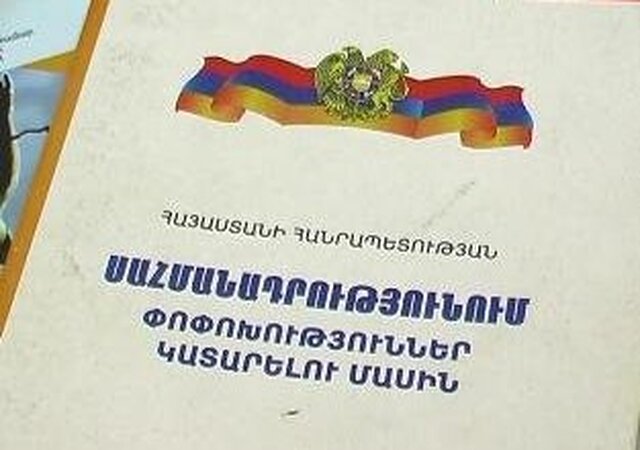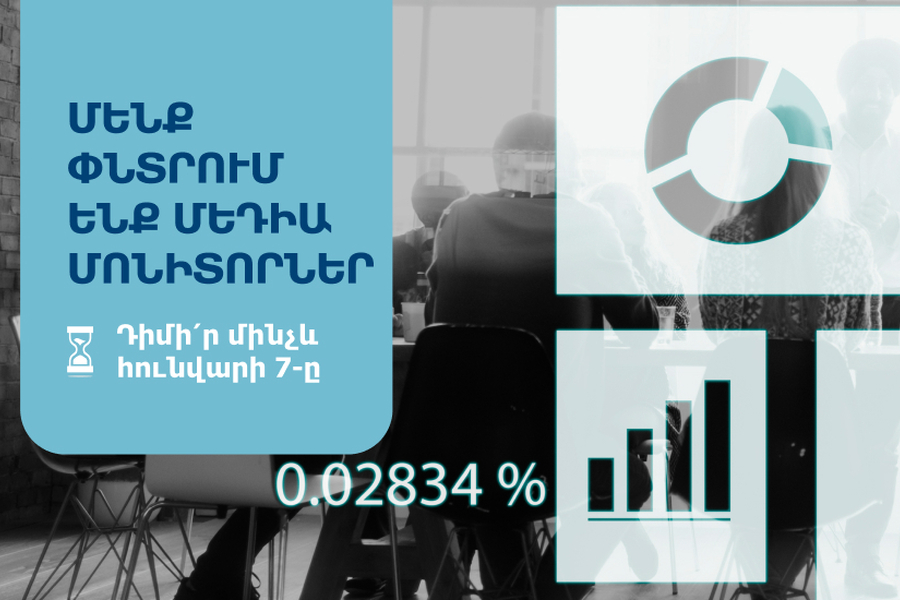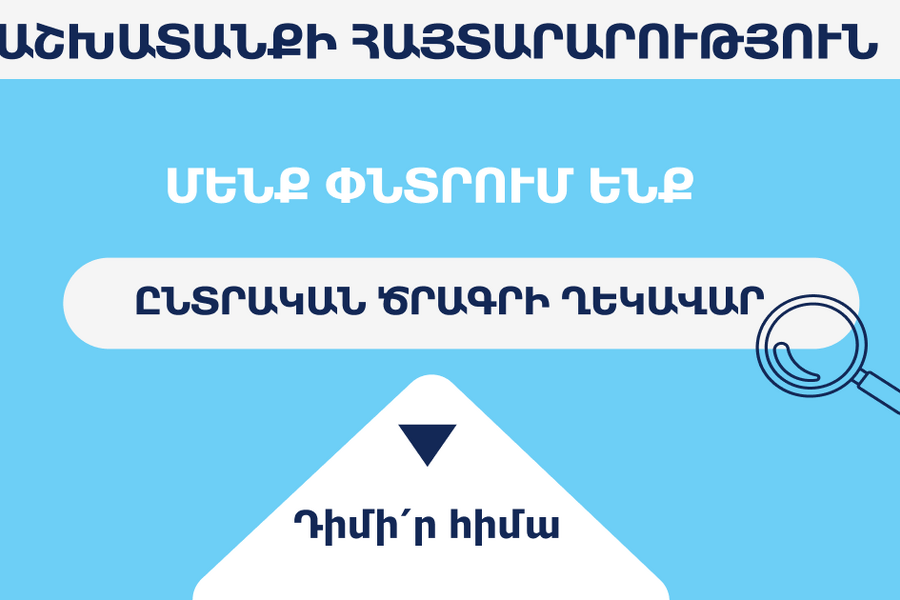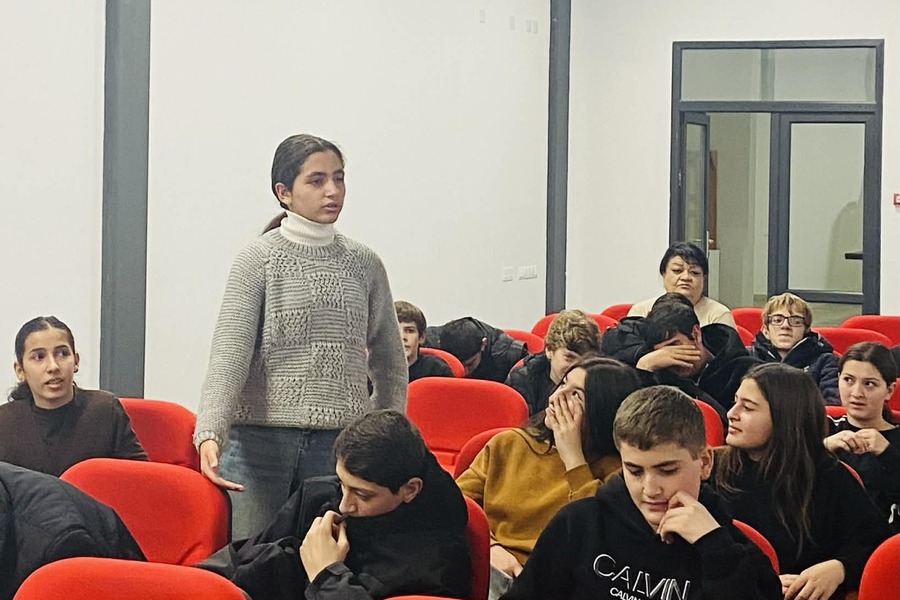Statement of Armenian CSOs on Constitutional reforms initiated by RA president
On September 4 2013, the President of Armenia Serj Sargsyan issued a decree to establish a Specialized Commission on Constitutional Reforms under the President’s office to draft amendments to the Armenian Constitution. This decision was the second in the chain of unexpected unilateral decisions started a day before, on September 3, 2013, with S.Sargsyan’s announcement to join the Customs Union. Before, there have not been any expert debates or public discussions in Armenia on the need for constitutional changes. Instead, legal experts and human rights groups continuously have raised the concern of poor enforcement and gross violations of the Constitution by the state authorities.
On April 10 2014, the Specialized Commission on Constitutional Reforms presented a Draft Concept Paper on the Constitutional Reforms of the Republic of Armenia, which proposed some changes related to human rights, local governance, judiciary, etc. Most importantly, the concept paper proposed a transitioning of the governance system from a semi-presidential to a parliamentary one, where the national elections will be held for the National Assembly only and the MPs will elect a president.
On September 11 2014, the Venice Commission of the Council of Europe issued an opinion on the mentioned concept paper. Along with analyzing and recommending to improve some of the proposed amendments, it stressed that the choice of the governance system in favor of a parliamentary one “also contain a political element and will have to be debated extensively in the country. In any case, a comprehensive constitutional reform can be carried out only on the basis of broad consensus within society.”[1] The need for a large consensus within society in respect of constitutional changes was also stressed by Anne Brasseur, President of the Parliamentary Assembly of the Council of Europe during her visit to Armenia on April 13-15 2015.[2]
In spite of the great controversy over the proposed constitutional amendments and lack of adequate justification of the urgency for modifying the founding document of the Republic of Armenia as well as the content of some major changes, the amendments are aggressively pushed forward.[3] On May 18-19 2015 some of the changes were discussed with members of the Venice Commission.[4] The date of the constitutional referendum is not set yet, but the process is apparently driven forward to meet the deadlines of the upcoming parliamentary elections of May 2017. Such rush of actions generates a wide belief within the society that constitutional amendments are initiated with one major purpose - reproduction of the political power of S.Sargsyan and/or the Republican Party of Armenia (RPA) led by him, as according to the existing Constitution the person may not run for the third term as the President of the state, while switch to the parliamentary system of governance will give S.Sargsyan an opportunity to reproduce and strengthen the rule of his political party.
As civil society organizations with comprehensive experience in electoral processes in Armenia, we are deeply concerned with the planned constitutional referendum, based on the following grounds:
- Specialized Commission on Constitutional Reforms is not actually an independent body of independent experts and hence is constrained to make independent proposals. This Commission is convened by and operates under the President. It is comprised of high-ranking officials of state institutions, the majority of whom are representatives (including two board members) of RPA and/or high-ranking officials appointed by the majority vote of legislators that operates under large influence of the President and executive. Hence, there are concerns that the members of the Commission are acting in the situation of conflict of interest and the proposed amendments as enforced will serve the interests of one political force rather than those of the people and society.
- Draft Concept Paper on the Constitutional Reforms does not propose resolution to the existing problems. Though it genuinely highlights a number of problems facing Armenia’s development, such as violations of human rights, political monopoly, distrust towards the electoral processes, problems related to the judiciary, etc., shared by many experts and organizations, it fails to propose provisions to actually resolve those problems. Meanwhile, according to independent experts, the proposed transition to the parliamentary system will strengthen the political monopoly and abolish healthy competition, advancing further the authoritarian regime of RPA. Elimination of the institute of presidential elections that usually observe the most active competition and civic participation will not contribute to regaining the trust in the electoral system.
- There is no public demand for constitutional changes. A recent household survey of 1300 citizens by ARP Group indicated that 60.1% of people think that there is no need to make constitutional changes. The absolute majority, approximately 75% of respondents, does not support constitutional changes. The biggest group of respondents - about 44.8%, thinks that constitutional changes will not resolve any problem.[5] Independent experts too do not see any urgency to change the Constitution. They do not see any sufficient justification for pushing for amendments, sense the desire of Serj Sargsyan to maintain the power and signal the risk to strengthen the authoritarian regime and closing the doors for future democratization of the state. Experts argue that the current Constitution does not create crisis for the government and there is no public demand for initiating constitutional changes.[6]
- There is apparent pressure on political forces to generate support for constitutional reforms. The lack of broad consensus on constitutional reforms within the society and with political opposition parties was highlighted by the European Commission’s recent Armenia Progress Report for 2014.[7] The Troika coalition of major political oppositional forces - Prosperous Armenia (PAP), Armenian National Congress (ANC) and Heritage - still in the end of 2014 stated on their opposition to constitutional changes. This position was one of the reasons for launching political vendetta against PAP. On February 12 2015, RA President in person and his party members made multiple allegations against PAP leader Gagik Tsarukyan and publicly threatened him with inspection of his companies to reveal tax evasion and with a query for his absenteeism from the parliament sessions. As a result of this pressure, G.Tsarukyan withdrew from the leadership of PAP and the parliamentary faction and announced about leaving the politics, though kept his MP’s seat. Such pressure on the leader of the second largest political party was actually a signal and warning to other political actors on that S.Sargsyan is ready to use all means in order to realize the planned constitutional amendments.
- There are serious concerns over the trustfulness of results of the constitutional referendum and major mechanisms of falsification of electoral violations are not removed. The concerns are conditioned by the negative experience of citizens with electoral processes. Intimidation, vote buying, abuse of administrative resources all over the country is a usual practice of handling elections. Still in 2011, the Gallup poll indicated that only 13% percent of women and 12% of men in Armenia believe in the honesty of elections, which placed it as the third lowest ranking among 125 countries in the world.[8] According to ARP Group survey, about 56.9% of respondents think that elections are falsified in Armenia and 31% think that there are violations even though those do not have much impact. The biggest group of respondents - 50% - thinks that referendums are senseless as people’s vote does account and everything is decided in advance. About 81% of people indicated that they do not trust at all or rather do not trust the constitutional reforms process.[9] Concerns over the legitimacy of electoral processes and results have been continuously highlighted by many local observer organizations, including the signatories of this statement.[10] A negative opinion about the presidential elections was expressed in the statement of the Eastern Partnership Civil Society Forum Steering Committee.[11] Additionally, concerns related to the quality of recent parliamentary and presidential elections of 2012 and 2013 respectively were raised by OSCE/ODIHR.[12] The planned constitutional referendum will be administered and overseen by the same institute – the Central Electoral Commission – in charge of administration of the past controversial elections, that raises doubts about the honesty of the constitutional referendum and its correspondence to international standards. A referendum on the founding document should not be marred by any illegitimacy should we expect the document be fully respected and observed by the government and citizens.
A major mechanism of recent election falsifications is widely believed to be maneuvers with the lists of potential voters. These lists include the names of all citizens above age of 18, embracing those who live, study and work abroad, but have not given up their Armenian citizenship.[13] These citizens are not allowed to vote outside Armenia, while within the country there is no adequate control over the use of their names. There are serious concerns regarding abuse of names of absent citizens with an aim of manipulating results of elections. Such worries have been rooted in the statistics as well as observation stories. In particular, detected cases of organized distribution of multiple passports in some precincts at 2012 parliamentary elections have not been pursued adequately by law enforcement bodies.[14] At 2013 presidential elections, many of the communities where the incumbent received the majority of votes recorded extremely high percent of participation, often exceeding 80, 90 and 100 percent.[15] Observers were systematically denied the opportunity of verification of names and signatures of noticed multiple voters, whereas such voting was not prevented by respective electoral commissions and not pursued by higher administrative bodies, the administrative court or law enforcement bodies. These issues would be easily resolved through the publicity of voters’ lists after elections, however there has been strong resistance by the authorities to the proposals of civil society organizations[16] to publish the lists that substantiates doubts over the significance of lists and possible abuse of names of absent citizens.
The above-mentioned facts and the history of electoral violations and fraud related to every election and referendum in Armenia since 1995 allow us to question the legitimacy of the proposed referendum considering their irrelevance to the current political situation in the country and the artificial urgency with which they are being pushed forward.
We, the undersigned organizations of the Citizens Observer Initiative urge all international organizations having a stake in the democratic reforms in Armenia not to support the constitutional amendments. The founding document of the state shall not be changed by any government unless there is a favorable political environment and consensus of major political players and public on the need and necessity for changing the Constitution, established practice of free and fair elections and the general public trust in the initiators of such radical change and the referendum process itself.
“Citizen Observer Initiative”, established in March 2013, is a coalition of civil society organizations that includes Transparency International Anticorruption Center, Helsinki Citizens Assembly Vanadzor, Europe in Law Association and Journalists Club “Asparez”. Its members have many years of experience of monitoring national elections in Armenia as well as in other countries. The first two organizations are also members of the European Platform for Democratic Elections. Experience of the mentioned organization extends beyond the observation of elections, including comments to legal amendments, awareness raising of citizens on their rights, management of crowdsource reporting platforms, and pursuit of election violations in administrative, judicial and law enforcement bodies. Since May 2013 the coalition observes local government elections throughout Armenia.
[1] European Commission for Democracy through Law (Venice Commission), Opinion on the Draft Concept Paper on the Constitutional Reforms of the Republic of Armenia (Rome, 10-11 October 2014), http://www.venice.coe.int/webforms/documents/default.aspx?pdffile=CDL-AD%282014%29027-e
[2] “Anne Brasseur's Concluding Statement after Her Yerevan Visit”, Armedia Information Analytical Agency (Yerevan, 16 April 2015), http://armedia.am/eng/news/16548/anne-brasseurs-concluding-statement-after-her-yerevan-visit.html
[3] Approximate date of the referendum as the end of 2015 was announced by Davit Harutyunyan, Minister – Chief of Staff of the Government and Member of the Specialized Commission on Constitutional Reforms in his interview to H3 TV Channel.
[4] Venice Commission, Armenia – Constitutional Reforms, http://www.venice.coe.int/webforms/events/?id=2009
[5] APR Group, Report on Research on RA Constitutional Report (Yerevan, September 2014), http://aprgroup.org/images/Library/Constitution/research%20report-eng-q.pdf
[6] Ibid.
[7] European Commission, Joint Staff Working Document: Implementation of the European Neighborhood Policy in Armenia/ Progress in 2014 and Recommendations for Actions (Brussels, 25 March 2015), http://eeas.europa.eu/enp/pdf/2015/armenia-enp-report-2015_en.pdf
[8]Lymari Morales, “Women Worldwide Less Confident Than Men in Elections”, Gallup, Inc. (Washington, 11 October 2012) http://www.gallup.com/poll/157997/women-worldwide-less-confident-men-elections.aspx
[9] APR Group, Report on Research on RA Constitutional Report (Yerevan, September 2014)
[10] “Observations of Human Rights NGOs of Armenia in the Run-up to the 2012 Parliamentary Elections” (Yerevan, 4 May 2012), http://transparency.am/en/news/view/453, “Statement on the 2012 Parliamentary Elections in the Republic of Armenia” (Yerevan, 11 May 2012), http://transparency.am/en/news/view/455, “Statement by EaP CSF 1st Working Group on Democracy, Human Rights and Good Governance on the Parliamentary Polls held in Armenia and the Upcoming Presidential Elections” (Brussels, 6 June 2012), http://transparency.am/en/news/view/476
[11] CSF Steering Committee, Statement on the Presidential Election in Armenia, February 18, 2013 (Brussels, 6 May 2013), http://eap-csf.eu/assets/files/Documents/130506_Armenia%20election%20sc%20statement.pdf
[12] OSCE/ODIHR, Republic of Armenia Parliamentary Elections, 6 May 2012: OSCE/ODIHR Election Observation Mission Final Report (Warsaw, 26 June 2012), http://www.osce.org/odihr/elections/91643?download=true and OSCE/ODIHR, Republic of Armenia Presidential Election, 18 February 2013: OSCE/ODIHR Election Observation Mission Final Report (8 May, 2013, Warsaw), http://www.osce.org/odihr/elections/101314?download=true
[13] According to Republic of Armenia National Statistical Service data, about 350,000 citizens have left the country since 2008 and not returned. See http://www.armstat.am/en/?nid=45&year=2014
[14] See http://www.youtube.com/watch?feature=player_embedded&v=Fadp6iwWeLM, http://www.youtube.com/watch?v=-sQ0TBbv9OY&feature=g-user-u
[15] Transparency International Anticorruption Center, Electronic Monitoring of 2013 Presidential Elections in Armenia, http://elections.transparency.am/2013/index.php?en_home,2
[16] “Statement of NGOs Concerned about Electoral Processes” (Yerevan, 19 November 2012), http://transparency.am/en/statements/view/163, “Call for Urgent Measures for Ensuring the Legitimacy of Electoral Processes in Armenia” (Yerevan, 27 November 2012), “NGOs Urge to Make Amendments to the Electoral Code (Yerevan, 22 January 2013), http://transparency.am/en/statements/view/168, “Call on National Assembly” (Yerevan, 12 March 2013), http://transparency.am/en/news/view/567 and “Statement on the 2013 Presidential Elections in the Republic of Armenia by Civil Society” (Yerevan, 26 February 2013), http://transparency.am/en/news/view/558






